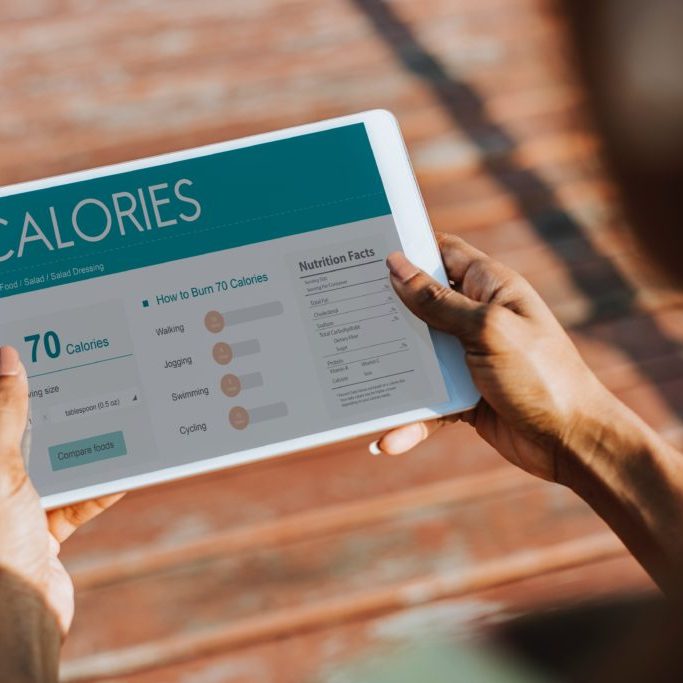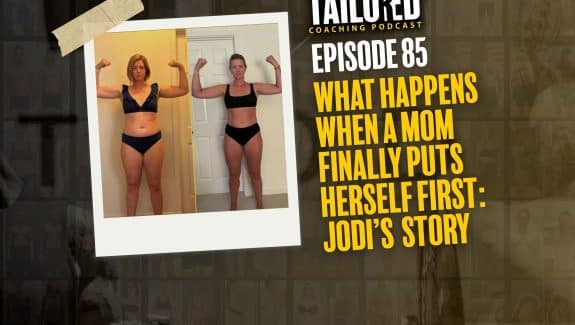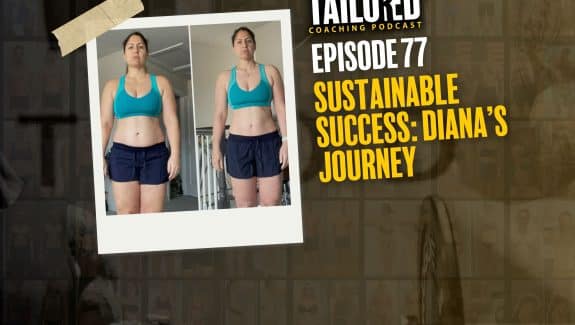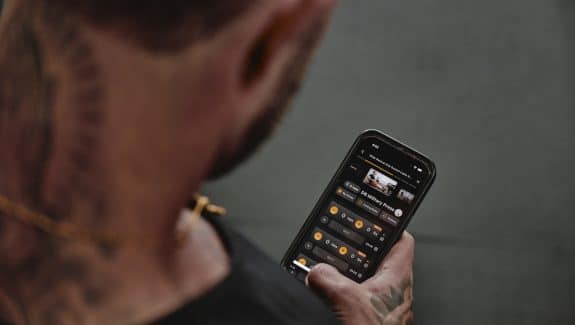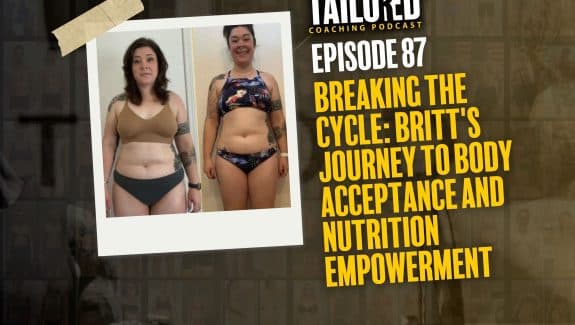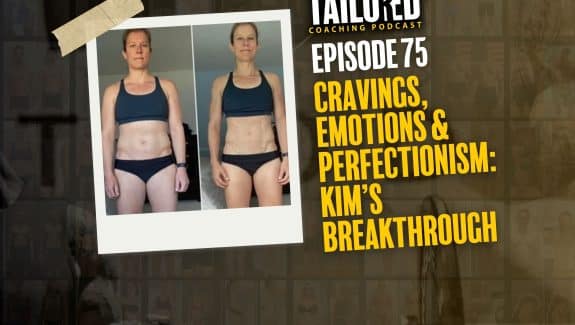What else goes into weight loss besides eating well and exercising?
In reality, there are quite a few variables that can impact your weight loss journey. And if you’ve ever made a commitment to workout more and eat a little less, I bet you’ve experienced some of those additional variables as challenges along the way.
My guess is that you’ve tried a diet (or twenty) in the past but they just haven’t worked for you long term. The problem is likely that you haven’t had an individualized program custom made for you and/or you haven’t had a coach or workout buddy to help keep you accountable. Am I right?
Without a plan that fits your lifestyle and without accountability, you might make it one month into a new diet but then get frustrated, scrap it, and end up following your old habits.
This is so common, in fact, that I put together a list of the eight most common diet mistakes people make that cause them to fall short of their goals.
Find out if you might be damaging your success with these common mistakes and how to fix them to get back on track!
1. Rushing The Process
We all want to reach our goals overnight, but sustainable results take time. That’s not fun to hear, but it is the truth. Think of how long you’ve been living your current lifestyle to get you to where you are today. Probably years, right? So why do you expect to change a lifetime of habits in only a few short weeks or months?
If you have a goal that takes you in a totally different direction from your current lifestyle, it’s unfair to assume you will get there in a very short amount of time. Having a positive mindset is integral to reaching your nutrition and fitness goals. Do you tend to focus on the speed bumps along the way or do you celebrate all the little victories and hype yourself up for continued progress?
The Solution:
Set a realistic timeline for your goals that includes accountability and consistency. Work with a coach or grab a workout buddy to help keep you accountable over the long term. Having someone to check in with will help keep you motivated week to week and can help you build daily consistency in the habits that will get you to your goals.
Also, don’t forget to celebrate all the small wins along your journey. It’s really easy to tell yourself you aren’t at your end goal so you’ve made zero progress, when in reality you have made progress every single day of your journey.
Celebrate the win that you eat vegetables twice a day when you didn’t before. Or how you started strength training three times per week when previously you only did a little cardio here and there. Those are huge improvements that will set you up for success for the rest of your life. Celebrate all those little changes you make and challenges you overcome along the way to your goal. Every stage of your journey matters!
2. Not Lifting Weights
While cardio can be a great tool for burning calories, strength training is what’s going to get you the body comp changes you’re looking for. Most people who have fat loss goals are looking for that lean physique, which doesn’t come from hours and hours of cardio, but more so from spending time in the weight room.
Studies have shown that weight training is extremely effective in achieving fat loss by increasing your metabolic rate and changing overall body composition.
Strength training also prevents the loss of muscle mass that occurs due to aging as well as a slower metabolism. Add in the benefits of strengthening your bones and improving coordination and balance, there’s really no one who should avoid strength training in their workout program.
The Solution:
Follow a strength training program throughout your nutrition journey. Whether your goals are building muscle mass, losing a few lbs, or general lifestyle health, strength work will play a huge role in getting you to where you want to be.
If you’re new to strength training, we recommend 3-4 days per week of lifting coupled with 1-2 days of cardio you enjoy. Diet, cardio, and lifting coupled in an intelligent manner will help you burn fat, maintain muscle, and look good naked.
3. Only Watching The Scale
So many variables impact the number that shows up on the scale each day, including hydration, types of foods you ate, whether or not you worked out, stress, sleep, etc. If you only measure progress by that one number, you might easily become frustrated and ditch your nutrition plan.
The scale might not move, but you could be losing fat mass and also building muscle or holding onto water. One example of this is people with fat loss goals who start a new lifting program. A new training regimen will cause inflammation in your body as your muscles try to adapt to the new training style. This will likely lead to fat loss and changes in your weekly pictures, but potentially zero drop in the scale.
The Solution:
Measure your progress with one than one metric. At BBP, we use weekly progress photos, biofeedback, scale weight, body measurements, and more to track your progress. If you have an emotional tie to the scale, consider not weighing yourself at all and record your workout performance, photos, and other measures instead.
Stressing over what the scale says will only make your weight loss journey more frustrating. Unless your sport requires specific weight classes, focus on how your clothes fit, how you feel day to day, and the other progress you’re making instead of your scale weight.
4. Being Overly Restrictive
If you’ve ever done the Whole 30, a “detox cleanse,” or some other short term, restrictive program, you’ve probably experienced pretty intense cravings for the foods you aren’t “allowed” to eat. When we cut out entire foods or food groups, they become increasingly more enticing until we throw in the towel and binge eat an entire box of cookies.
This was recently proved in a short term study of people who restricted sugar intake. Those who went cold turkey on sweet foods ended up having increased cravings and a 33% increase in their value for high sugar foods. Despite being a short term and small study, this provides insight that restricting foods entirely may not be a sustainable weight loss option.
The Solution:
Shoot for 90/10 or even 80/20 with your food quality. At least 80% of the time reach for foods that either grew from or walked the earth, or swam in the seas. Save that 10-20% of your food intake for those foods you don’t want to live without, your “non-negotiables.”
This is also where tracking macros can be a really useful tool. You essentially have a budget for the day (your macro targets) but you can spend (eat) your budget to your liking. Foods are not “good” or “bad,” some foods just fuel our bodies differently than others. Find a way of eating that includes foods you love so you can stick to your nutrition plan for the long term.
5. Skipping Your Rest Day
Exercising six or seven days a week with HIIT workouts and strength training can quickly lead to burnout. That much exercise might also be too much for your body to recover from and keep you in a stressed, sympathetic state.
If your body isn’t able to recover in between workouts, you can’t physically adapt and get stronger and fitter and closer to your goals. Living in a stressed state will also cause your cortisol levels to remain elevated, meaning more water retention and no weight loss on the scale. This can be incredibly frustrating and might even push you to do more training sessions when all your body might need is an extra rest day.
The Solution:
Schedule at least one rest day each week. Listen to your body to make sure you are recovering from your workouts so your body can adapt and get stronger.
If you need an additional rest day, take it or make it an active recovery day by opting for a LISS workout instead of your usual high intensity work.
Add in self care and recovery modalities that make you feel good and help your body switch into parasympathetic (rest and digest) mode. Aim to balance the stressors in your life with equal doses of recovery to make your fat loss journey less stressful on your body and mind.
6. Guesstimating Portions
When tracking your food, if you don’t use a food scale then you really are just making your best guess. That is a perfectly acceptable option if you are at maintenance or don’t have a strict timeline for your goals. However, if you are getting on stage soon, have a wedding coming up, or a different specific goal you’re aiming for, weighing and measuring your food is key.
People tend to underestimate their portions when not accurately tracking their food. The difference could be small meal to meal, but add those small differences up over a week and they could completely negate the calorie deficit you thought you were in.
Take the above picture, for example. If I was eyeballing my cereal, I would be off by about 18g, an extra half serving. It doesn’t sound like much, especially if it’s just for one day, but if I incorrectly guesstimate every day it’s going to blow my carbs up over the week.
The Solution:
Weigh/measure your food to the best of your ability. Use your food scale when you cook and prep your meals for the week and pre-track in your food log so you know you are on target to hit your goals.
When eating at a restaurant or food someone else prepared, try to keep your meals simple to avoid additional sauces/oils/ingredients that might pack a calorie punch. For example, order your favorite grilled protein and veggies with sauce on the side. The server should know how many ounces of protein are in a serving and you can take your best guess on the vegetables.
Tracking your food will never be perfect since nutrition labels can be up to 20% off, but the more you weigh/measure and eat foods with few ingredients, the lower the margin of error will be and the more accurate your food logs will be!
7. Taking The Weekend Off
So your coach gave you some refeed days and you’re going to save them for Saturday and Sunday and fill those extra carbs with craft brews? Not the best idea…
Too often people lose their motivation on the weekend and one “cheat day” becomes a weekend of overindulging, just to reign it all in again and recommit to their plan come Monday. Not only is this a form of bingeing and restricting which can lead to disordered eating down the road, but it’s also killing any progress you made throughout the week days.
Going hog wild 1-2 days each week can set you back 1,000 calories or more and also cause digestive stress, bloating, and water retention. This will make the scale jump up and likely cause feelings of frustration and guilt.
The Solution:
Fit the foods you can’t live without into your daily nutrition plan and plan ahead for those big, celebratory meals. Like I mentioned above, restricting foods usually isn’t sustainable in the long run so shoot for high quality, whole foods most of the time and plan ahead for your weekends/date nights/girls weekends/etc.
Here are some tips to use when you know you have a fun social event coming up and you won’t have control over the food available:
- Try fasting for the morning. Skip or go light on breakfast and then you are almost sure to be under your calorie budget for the day.
- Eat mainly protein & veggies for your first few meals that day. You’re still saving calories (especially fats/carbs) for your big meal later.
- Take the day off from tracking. It’s a good chance to practice eating intuitively. Pay attention to your portions & hunger/fullness cues and fill your plate with veggies and protein.
- Time your meals. Try to make your meal take at least 20 minutes and stop eating when you’re 80% full. It can take our bodies 20 minutes to send the signal to our brain that we’re full. This will not only allow you to be more mindful with your food and enjoy company, but will also save you from feeling overly stuffed afterwards.
8. Not Getting Enough Sleep
Sleep is one of the most important yet least sexy topics to address in your weight loss journey. Have you ever had a shitty night’s sleep and realize the next day you are craving chinese take out? That’s because lack of sleep raises your stress hormone, cortisol, which can increase appetite and cravings.
Other hormones, like ghrelin and leptin, can also be affected by lack of sleep, leading you to consume more calories than you would after a restful night of shut eye. It’s no surprise that research, like this study, continues to draw a connection between lack of sleep and obesity.
The Solution:
Before asking your coach to cut calories and try out some new, fancy diet, make sure your stress is low and your sleep is restful and consistent. Aim to get at least 7 hours of sleep each night and practice daily relaxation techniques like meditation, journaling, or yoga.
If you find it hard to get enough sleep, try creating a new bedtime routine that helps you wind down each night. Make sure it includes putting your phone (and any other screens) away at least an hour before bed time. Start by going to bed just five minutes earlier each night. Those five minutes each night add up quickly and soon you’ll start to feel the benefits of a little extra shuteye. Slowly add to those five minutes week by week until you hit that seven hour mark.
—
If you’re ever feeling lost in your nutrition journey, get the basics down first. Sleep at least 7 hours every night, use daily stress relief tactics, stay hydrated, eat mostly whole foods, and move your body every day. The basics are always a good place to start!
With nearly a decade of experience working with a wide variety of clients, we at BBP know that everyone is different and needs to be supported differently to reach their own goals. We all have our own challenges and obstacles to face between where we are now and where we want to be.
Nutrition journeys of any kind take time, dedication, and accountability. The good news is, you don’t have to navigate through alone! If you’re ready to commit to the path to your goal, click here to talk with a coach today.


